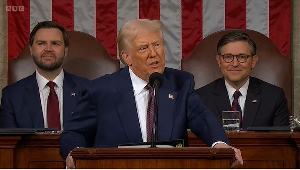Accra, Jan 29, GNA - The Ghana National Association of Teachers (GNAT) on Friday, endorsed the recommendation of the Presidential Committee on Education to maintain the three-year duration of the Senior Secondary School (SSS) Programme.
The Association noted that well laid fundamentals at the pre-school level and the inculcation of learning skills at the basic level supported by well trained and motivated teachers would make a prolonged SSS programme from three to four years unnecessary.
Many experts and groups including the Conference of Heads of Assisted Secondary Schools in the past had called for the extension. However, Mrs Irene Duncan-Adanusa, General Secretary of the GNAT said maintaining the three-year period would strengthen Ghana's relations with other West African countries it shared the educational testing services of the West African Examinations Council with. Mrs Duncan-Adanusa who was speaking at a media interaction between the to consolidate it instead of frequent experimentation.
The interaction organised jointly by the GNAT and the Entertainments Committee of the Ghana Journalists Association (GJA), was to create a platform for members of the two bodies to know each other better and to discuss issues concerning the teaching profession in Ghana. Mrs Duncan-Adanusa said Association advised Government to stick to the existing language policy with English and French being introduced as compulsory subjects from Primary Four to the end of the SSS level. French should not be treated casually as it currently existed, she said.
The Association called for the immediate implementation of the proposals contained in the White Paper at the Early Childhood level with the available resources.
The GNAT General Secretary said the Association had been engaged in Early Childhood Development Projects in 10 pilot districts and stated that they would be extended to 20 districts in the next phase. The Association called on the Government to take up the professional development of Early Childhood educators for to all children to have "a head start in accessing education".
Mrs Duncan-Adanusa said the "present bane" of the Junior Secondary School (JSS) system, for which a proposal had been made to change it to Junior High School, did not reside in the name, but rather weaknesses such as "ill-prepared and de-motivated teachers" and lack of effective guidance and counselling.
Also the view expressed by some experts that the JSS should be part of the SSS system would not hold now since there were only 475 public SSS as against 5394 JSS and since some of the SSS would be far and not within the reach of 12 to 15 year-olds, she stated.
"The solution would be to strengthen the teaching staff, resource the schools, provide requisite infrastructure and safely accommodate teachers while those in deprived areas are provided with economic incentives," Mrs Duncan Adanusa said.
She called for more logistical and financial support for teachers on study leave instead of the SNNIT loans, especially for those studying through the Distance Learning programme while maintaining a full time class.
Ms Ajoa Yeboah Afari, President of the GJA noted that both the teacher and the journalist had educational roles to play and expressed the hope that the beginning of the collaboration between the two bodies would promote educational development in the country.
General News of Saturday, 29 January 2005
Source: GNA
















